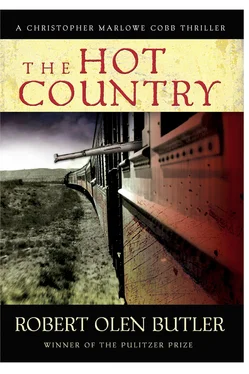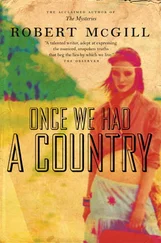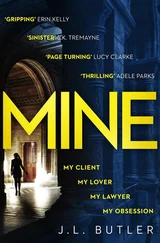I looked over my shoulder at him. He’d drawn his craggy moon of a face out of his collar and had it angled a little like he’d just sprung a horsewhip of a question on a dirty politician.
I ruffled around in my head trying to think if at some point I’d suggested any connection to him between the one in white and the one in black. It felt like a year ago I’d sent him that story, though it was only a few weeks. But I felt certain I hadn’t. “Did I get drunk and send a telegram I don’t remember?” I said.
“Nah,” Clyde said. “Call it a newsman’s intuition.”
I shrugged and looked away from him again. But I wasn’t talking. And that shrug was just for show. It was all still there inside me. The whole story.
She more or less came with the rooms I rented in a house just off the zócalo . I’d barely thrown my valise on the bed and wiped the sweat off my brow when she peeked her head in at the door, which I’d failed to close all the way. These two big dark eyes and a high forehead from her Spanish grandfather or whoever. “Señor?” she said.
“Come in. As long as you’re not one of Huerta’s assassins,” I said in Spanish, which I’m pretty good at. I figured that accounted for the smile she gave me.
“No problem, señor,” she said. She swung the door open wide now, and I saw a straw basket behind her, waiting. “I’ll take your dirty things,” she said.
“Well, there was this time with Roosevelt in San Juan. .” I said, though it was under my breath, really, and I let it trail off, just an easy private joke when I was roughed up from travel and needing a drink.
But right off she said. “You keep that, señor. Some things I can’t wash away.” She did this matter-of-factly, shrugging her thin shoulders a little.
“Of course,” I said. “It’s probably a priest I need.”
“The ones in Mexico won’t do you much good,” she said.
She kept surprising me, and this time I didn’t have a response. I just looked at her, thinking what a swell girl, and I was probably showing it in my face.
Her face stayed blank as a tortilla, and after a moment, she said. “Your clothes.”
My hand went of its own accord to the top button on my shirt.
“Please, señor,” she said, her voice full of weary patience, and she pointed to my bag.
I gave her some things to wash.
“I’m Christopher Cobb,” I said. “What’s your name?”
“I’m just the local girl who does your laundry,” she said, and I still couldn’t read anything in her face, to see if she was flirting or really trying to put me off.
I said, “You’ve advised me to keep away from your priests even though I’m plenty dirty. You’re already more than a laundry girl.”
She laughed. “That was not for your sake. I just hate the priests.”
“That’s swell,” I said. Swell enough that I’d said it in English, and I spoke some equivalent in Spanish for her.
She hesitated a moment more and finally said, “Luisa Morales,” and then she went out without another word, not even an adios.
And I stood there staring at the door she’d left open at exactly the same angle she’d found it when she came in. And I’ll be damned if I wasn’t disappointed because I couldn’t explain to her about my name. Christopher Cobb is how I sign my stories but Christopher Marlowe Cobb is my full name and my editors right along have all wanted me to use the whole moniker in my byline, but I find all those three-named news boys — the William Howard Russells and the Richard Harding Davises and the George Bronson Reas — and all the rest — and the host of magazine scribblers and the novelists with three names are just as bad — I think they all make themselves sound pompous and full of self-importance. And it’s not as if I don’t like the long version of me: My mother gave me the name, after all, when she first laid me newborn in a steamer trunk backstage at the Pelican Theatre in New Orleans and she went on to become one of the great and beautiful stars of the American stage — the eminent, the estimable, the inimitable Isabel Cobb — and Christopher Marlowe was her favorite, though he didn’t understand women and probably didn’t like them, because he never wrote anything like a true heroine in any of his plays, and maybe that tells you something about my mother’s taste in men. She did love her Shakespeare as well, and she played his women, comic and tragic, to worldwide acclaim, but she named me Christopher Marlowe and she called me Kit like they called him, and Kit it is. I just keep the three names packed away in a steamer trunk, and if Luisa Morales had only stayed a moment longer, I would have told her to call me “Kit”—everyone close to me does — though no doubt that would have meant nothing whatsoever to her, and if I’d actually explained all that about my name the day I met her, she would have thought me a madman. Which is what I was thinking about myself. I was a madman to want to explain all this to a Mexican washer girl.
So I beat it down to the docks, where I found out the location at sea of the German ship, the Ypiranga, said to be carrying fifteen million rounds of ammunition. Then I stopped at the telegraph office where Clyde had wired me. It seemed that half the Great White Fleet was also headed in my general direction, including the troopship Prairie, the battleship Utah, and Admiral Fletcher’s flagship, the Florida. Things were getting interesting, but for now all there was to do was wait. So I ended up at a cantina I reconnoitered near my rooms.
Not that thoughts of Luisa Morales came back to me while I was drinking, not directly. I soaked up a few fingers of a bottle of mezcal and sweated a lot at a table in the rear of the cantina with my back to the wall and I watched the shadows of the zopilotes heaving past, the mangy black vultures that seemed to be in the city’s official employ to remove carrion from the streets, and I thought mostly about what crybabies Thomas Woodrow Wilson and his paunchy windbag of a secretary of state William Jennings Bryan turned out to be. They complained about the dictator right next door in Mexico and his likely complicity in the murder of the previous president — not to mention his threat to American business — but when they finally found an excuse to invade the country, they grabbed twelve square miles and stopped and sat on their butts. Out of what Wilsonian moral principle? The one that let him invade in the first place but only a toehold’s worth. What principle was that, exactly? I lifted my glass to Teddy Roosevelt and toasted his big stick.
I’d done that same thing in Corpus Christi a couple of weeks earlier with a guy who knew how it would all happen. I was waiting in Corpus for my expense money to show up at a local bank. I found a saloon with a swinging door down by the docks, but the spot I always like at the back wall had a gaunt hombre in a black shirt with a stuffed bandolera and beat-up black Stetson sitting in it. He saw me look at him. Coming in, I’d passed a couple of Johnnies rolling in the dirt outside gouging each other’s eyes and I didn’t want to add to the mood, so I was ready to just veer off to the rail. But the guy in the Stetson flipped up his chin, and the other chair at the table scooted itself open for me, a thing he did right slick, timed with the chin flip, like the toe of his boot had been poised to invite the first likely-looking drinking buddy.
So I found myself with Bob Smith and a bottle of whiskey. He was gaunt, all right, but all muscle and gristle, of an indeterminate age, old enough to have been through quite a lot of serious trouble but young enough not to have lost a bit off his punch. He had eyes the brown you’d expect of mountain-lion shit. He didn’t like being called a “soldier of fortune,” if you please, he was an insurrecto from the old school, ’cause his granddaddy had stirred things up long before him, down in Nicaragua, and his daddy had added to some trouble, too, somewhere amongst the downtrodden of Colombia before all the stink about the canal, so this was an old family profession to him, and as far as personal names were concerned, I was to address him by how he was known to others of his kind, which was to say, “Tallahassee Slim.”
Читать дальше












